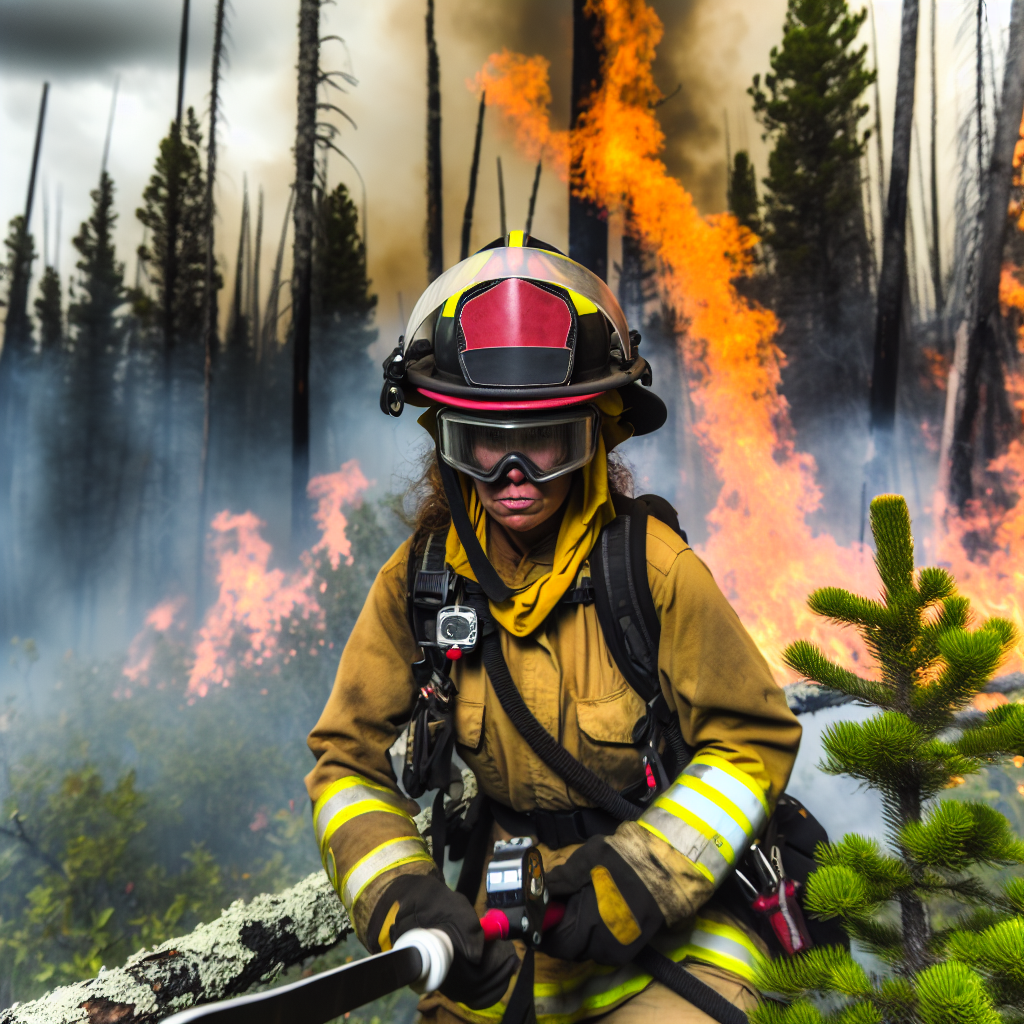Introduction:
A wildland firefighter is responsible for combating fires in natural settings such as forests, grasslands, and mountains.
Wildland firefighters play a crucial role in protecting lives, property, and the environment from devastating wildfires.
Training and Education:
Wildland firefighters typically need a high school diploma or equivalent.
Some positions may require advanced training or certification.
Training programs often include classroom instruction, physical fitness training, and hands-on firefighting exercises in various scenarios.
Physical Fitness:
Wildland firefighters must be in top physical condition due to the strenuous nature of the job.
They must pass a fitness test.
Physical strength, agility, endurance, and the ability to work in harsh conditions are essential qualities for wildland firefighters.
Experience:
Many wildland firefighters gain experience through seasonal work or volunteer firefighting opportunities before pursuing full-time positions.
Experience in related fields such as forestry, land management, or emergency services can also be beneficial for aspiring wildland firefighters.
Employment Outlook:
The demand for wildland firefighters is expected to remain high, especially in areas prone to wildfires due to climate change.
Job opportunities may vary depending on the region and the severity of wildfire seasons, but overall, there is a consistent need for skilled firefighters.
Research and Understand the Profession:
Learn about the Job Duties and Responsibilities of a Wildland Firefighter:
Wildland firefighters are responsible for suppressing wildfires in forests and other natural areas.
They work to contain and extinguish fires to protect lives, property, and the environment.
Job duties may include building fire lines, operating heavy machinery, and conducting controlled burns.
Research the Physical and Mental Demands of the Profession:
Wildland firefighting can be physically demanding, requiring individuals to work long hours in rugged terrain and adverse weather conditions.
Firefighters must be in good physical condition to handle the rigors of the job.
The mental demands of the profession can also be significant, as firefighters often face high-stress situations and must make quick decisions to ensure the safety of themselves and others.
Educational Requirements:
Obtain a High School Diploma or GED:
Most wildland firefighting positions require a high school diploma or equivalent.
Some positions may also require additional education or training in fire science or a related field.
Transform Your Career Today
Unlock a personalized career strategy that drives real results. Get tailored advice and a roadmap designed just for you.
Start NowPursue Additional Training and Certifications:
While not always required, obtaining certifications such as Firefighter I and II, Emergency Medical Technician (EMT), and Wildland Firefighter Training can enhance your qualifications and make you more competitive in the field.
Physical Fitness Requirements:
Maintain Physical Fitness:
Wildland firefighters must be in good physical condition to handle the demands of the job.
Regular exercise and strength training can help prepare you for the physical challenges of firefighting.
Meet Agency-Specific Fitness Standards:
Different agencies may have specific fitness standards that applicants must meet.
These standards may include requirements for endurance, strength, and agility.
Be sure to research the fitness standards of the agency you are applying to and train accordingly.
Gain Experience:
Volunteer with Local Fire Departments:
Volunteering with local fire departments or conservation organizations can provide valuable hands-on experience.
It can help you develop skills relevant to wildland firefighting.
Participate in Training Programs:
Participating in training programs such as the Wildland Firefighter Academy or the National Interagency Fire Center (NIFC) can provide you with the knowledge and experience needed to pursue a career in wildland firefighting.
Apply for Wildland Firefighter Positions:
Research Job Opportunities:
Research job opportunities with federal, state, and local agencies that employ wildland firefighters.
Look for openings on agency websites and job boards.
Submit Application Materials:
Submit a resume, cover letter, and any required certifications or training documentation when applying for wildland firefighter positions.
Be sure to highlight any relevant experience or qualifications.
Prepare for Interviews:
Prepare for interviews by researching the agency and practicing common interview questions.
Highlight your skills and experience related to wildland firefighting.
Be prepared to discuss your physical fitness and ability to work in high-stress situations.
Pathway to a Rewarding Career in Wildland Firefighting
Becoming a wildland firefighter requires dedication, physical fitness, and a commitment to serving others.
By researching the profession, obtaining the necessary education and training, gaining experience, and applying for positions, you can pursue a rewarding career in this challenging and important field.
Gain Relevant Education and Training:
Obtain a high school diploma or equivalent. This is the basic educational requirement for becoming a wildland firefighter. Completing high school shows potential employers that you have the necessary educational foundation.
Showcase Your Business Today
Reach thousands of readers actively exploring professional services. Publish your business profile and grow your audience now.
Publish NowLook into educational programs or certifications related to wildland firefighting. While a high school diploma is the minimum requirement, having additional education or training can give you an edge in the competitive job market.
Consider enrolling in a fire science program. Many colleges and universities offer degrees in fire science or related fields. These programs provide you with a solid understanding of fire behavior, suppression techniques, and safety protocols.
Take courses in forestry or environmental science. Wildland firefighters often work in remote outdoor settings, so having a background in forestry or environmental science can be beneficial. These courses can help you understand the ecosystems you’ll be working in and how to best protect them.
Get certified as an Emergency Medical Technician (EMT). Wildland firefighters often provide medical assistance to team members or individuals in need. Having EMT certification can increase your employment opportunities and ensure you’re prepared to handle medical emergencies in the field.
Complete training in fire behavior and safety. Understanding how fires behave and how to safely manage them is crucial for wildland firefighters. Look for training programs that focus on fire behavior, suppression tactics, and safety protocols specific to wildland firefighting.
Participate in physical fitness programs. Wildland firefighting is physically demanding work, often requiring long hours of strenuous activity in challenging terrain. Staying in top physical condition is essential for performing job duties safely and effectively.
Gain hands-on experience through internships or volunteer work. Many agencies and organizations offer internships or volunteer opportunities for individuals interested in wildland firefighting. This hands-on experience can help you develop skills, build connections in the industry, and demonstrate your commitment to the field.
Uncover the Details: Campus Security Officer: Collaborating with Faculty
Build Physical Fitness:
Start by creating a comprehensive fitness routine to enhance your strength and endurance.
Your fitness level is crucial for surviving the demanding nature of wildland firefighting.
Incorporate a mix of cardiovascular exercises, weight training, and flexibility exercises into your routine.
Building overall physical fitness will prepare you for the challenges you will face in the field.
Consider joining a local gym or fitness center to access a variety of equipment and resources.
These can help you achieve your fitness goals.
Additionally, participate in firefighting-specific fitness classes or training programs.
These programs are designed to simulate the physical demands of the job.
They can better prepare you for the rigors of wildland firefighting.
Engage in activities that mimic the movements and tasks of a wildland firefighter.
This can include hiking with a heavy backpack, carrying heavy objects, and practicing climbing over obstacles.
Regularly assess your progress and adjust your fitness routine accordingly.
Focus on improving your strength, stamina, and agility to ensure you are in top physical condition.
When called upon to fight wildfires.
Gain More Insights: Correctional Officer Physical Fitness Requirements
Obtain Required Certifications:
- Look into obtaining certifications such as the National Wildfire Coordinating Group’s Basic Firefighter certification.
- Research any additional certifications or licenses required in your state.
When pursuing a career as a wildland firefighter, obtaining the necessary certifications is crucial to ensure you are qualified and prepared for the demands of the job.
Here are some steps to help you navigate the process of obtaining the required certifications:
National Wildfire Coordinating Group’s Basic Firefighter Certification
The National Wildfire Coordinating Group (NWCG) offers a Basic Firefighter certification that is recognized across the country.
This certification provides the basic knowledge and skills necessary to work safely and effectively on the fireline.
To obtain this certification, you will need to complete training courses and pass a written exam.
Training courses cover topics such as fire behavior, safety procedures, use of firefighting tools and equipment, and communication protocols.
These courses are typically offered by federal and state agencies, as well as private organizations.
Once you have completed the required training, you will need to pass a written exam to demonstrate your understanding of the material.
Additional Certifications or Licenses
In addition to the NWCG Basic Firefighter certification, you may need to obtain additional certifications or licenses depending on the requirements in your state.
These certifications could include specialized training in areas such as driving fire apparatus, operating heavy equipment, conducting prescribed burns, or managing incident command systems.
Research the specific requirements in your state to determine what additional certifications or licenses you need to pursue.
Contact your state forestry agency or fire department for guidance on the necessary certifications and training opportunities available to you.
By obtaining the required certifications and licenses, you will demonstrate your commitment to professionalism and readiness as a wildland firefighter.
This will not only enhance your skills and knowledge but also increase your chances of successfully securing a position in this competitive field.
Find Out More: Wildland Firefighter Coordination with Local Authorities
When it comes to becoming a wildland firefighter, gaining experience is crucial to increase your chances of getting hired.
Showcase Your Business Today
Reach thousands of readers actively exploring professional services. Publish your business profile and grow your audience now.
Publish NowHere are some essential steps to help you gain valuable experience in the field:
Volunteer with Local Fire Departments:
One of the best ways to gain experience in firefighting is by volunteering with your local fire department.
This will not only provide you with hands-on training but also give you an opportunity to work alongside experienced firefighters and learn from them.
Participate in Firefighting Internships:
Many fire departments and organizations offer firefighting internships that provide a valuable learning experience.
These internships can range from a few weeks to several months and will give you a chance to gain practical skills and knowledge in firefighting.
Look for Seasonal Firefighting Opportunities:
Government agencies such as the U.S. Forest Service, Bureau of Land Management, and National Park Service often hire seasonal firefighters during the peak fire season.
Private companies that specialize in wildfire management also offer seasonal firefighting positions.
These opportunities are a great way to gain experience and build your skills in wildland firefighting.
Join Wildland Firefighting Crews:
Another way to gain experience is by joining wildland firefighting crews.
These crews are often deployed to wildfires across the country and provide an excellent opportunity to gain hands-on experience in firefighting.
You can apply to join federal crews such as Hotshot Crews or helitack crews, or look for opportunities with private firefighting companies.
Attend Training Programs and Workshops:
There are many training programs and workshops available for aspiring wildland firefighters.
These programs cover various aspects of firefighting, such as fire behavior, safety procedures, and equipment operation.
By attending these programs, you can gain valuable skills and knowledge that will help you excel in the field.
Obtain Certifications:
Having the right certifications is essential for becoming a wildland firefighter.
Some of the certifications that are commonly required include the Basic Firefighter Certification, Wildland Firefighter Certification, and Incident Command System (ICS) Certification.
By obtaining these certifications, you can demonstrate your commitment to the field and increase your employability as a wildland firefighter.
By following these steps and gaining relevant experience in firefighting, you can enhance your skills, knowledge, and credentials to become a successful wildland firefighter.
Remember, dedication, hard work, and a passion for the job are key to achieving your goal in this challenging yet rewarding profession.
Uncover the Details: Work Environment and Conditions for Secret Service Agents

Network in the Field:
Networking within the wildland firefighting community is crucial for anyone looking to enter or advance in this field.
By attending job fairs or industry-specific networking events, you can make connections with potential employers and learn about job opportunities.
Connecting with current wildland firefighters can provide valuable insights into the profession and offer mentorship to help you navigate your career path.
They can share their experiences, offer advice on necessary qualifications, and provide tips on skills development.
Building a network of contacts within the industry can also help you stay informed about job openings, training programs, and other opportunities.
By establishing relationships with professionals in the field, you can gain access to valuable resources and support that can help you succeed in your career as a wildland firefighter.
In addition to attending events and connecting with current firefighters, consider joining professional organizations or online forums dedicated to wildland firefighting.
These platforms can provide a wealth of information, resources, and networking opportunities to help you stay connected and informed about the latest developments in the field.
Networking is not just about making connections; it’s also about building relationships and fostering a sense of community within the wildland firefighting industry.
By actively engaging with other professionals and seeking out mentorship opportunities, you can enhance your skills, knowledge, and career prospects in this challenging and rewarding field.
Prepare for the Hiring Process:
When it comes to becoming a wildland firefighter, being prepared for the hiring process is crucial.
Here are some steps you can take to increase your chances of getting hired:
Update Your Resume:
- Highlight relevant skills such as physical fitness, teamwork, and problem-solving abilities.
- Include any previous firefighting experience, even if it’s not specifically in a wildland setting.
- Mention any certifications or training you have completed related to firefighting.
Practice for Interviews and Assessments:
- Research common interview questions and practice your responses.
- Prepare examples of how you’ve demonstrated key skills like leadership and adaptability in the past.
- Practice physical assessments such as carrying heavy loads over rough terrain or using firefighting equipment.
By updating your resume and practicing for interviews and assessments, you’ll be better equipped to showcase your qualifications and skills during the hiring process.
Remember to also stay organized and keep track of application deadlines and requirements to ensure you don’t miss any opportunities.
Stay Committed to Professional Development:
As a wildland firefighter, it’s essential to stay committed to your professional development.
This means staying up-to-date on the latest changes and advancements in the field of wildland firefighting.
By staying informed, you can ensure that you are equipped with the knowledge and skills necessary to excel in your role.
One way to stay committed to your professional development is to actively seek out ongoing training and education opportunities.
These opportunities can help you acquire new skills, stay current with industry best practices, and advance your career.
Whether it’s attending workshops, seminars, or pursuing further education, investing in your professional development can pay off in the long run.
Showcase Your Business Today
Reach thousands of readers actively exploring professional services. Publish your business profile and grow your audience now.
Publish NowBy staying committed to professional development, you demonstrate your dedication to the field of wildland firefighting.
This commitment can set you apart from others in the field and help you achieve your career goals.
- Stay informed about changes and advancements in the field of wildland firefighting.
- Consider ongoing training and education opportunities to advance your career.
Key Steps to Becoming a Wildland Firefighter
Recap key steps to becoming a wildland firefighter.
Emphasize the importance of dedication, physical fitness, and ongoing learning in this challenging profession.
Becoming a wildland firefighter requires dedication.
Physical fitness is essential for the demanding tasks you will face.
Ongoing learning will help you stay prepared and informed.
Stay committed to training and prepare yourself for the challenging tasks ahead.
With the right mindset and preparation, you can embark on a rewarding career as a wildland firefighter.
Additional Resources
Center for Firefighter Safety, Health, and Well-being | NIOSH | CDC
Firefighters : Occupational Outlook Handbook: : U.S. Bureau of …
[E-Books for Sale]
The Big Book of 500 High-Paying Jobs in America: Unlock Your Earning Potential
$19.99 • 500 High-Paying Jobs • 330 pages
Explore 500 high-paying jobs in America and learn how to boost your career, earn more, and achieve success!
See All 500 High-Paying Jobs of this E-Book
1001 Professions Without a Degree: High-Paying American Jobs You Can Start Now
$19.99 • 1001 Professions Without a Degree • 174 pages
Discover 1001 high-paying jobs without a degree! Unlock career tips, skills, and success strategies for just $19.99!




